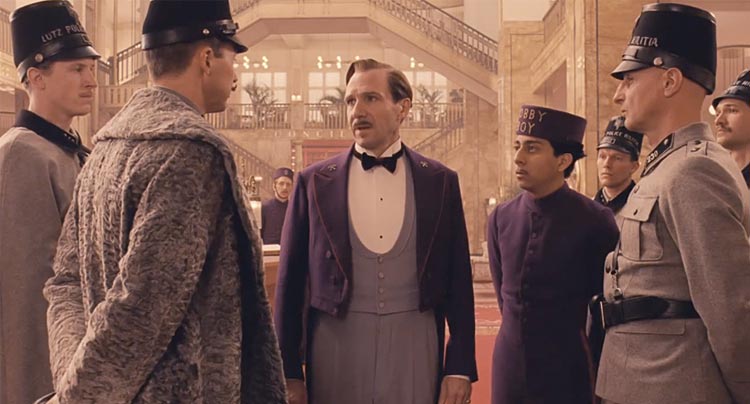
A well-done and admirable piece of fluff.

A well-done and admirable piece of fluff.
Partway through The Grand Budapest Hotel, there’s an argument between Dmitri (Adrien Brody, looking brilliantly evil) and his deceased mother’s lawyer (Jeff Goldblum). The lawyer refuses to hand the dead woman’s fortune over to her son as the details of her murder haven’t been cleared up. Dmitri angrily leaves, and his henchman (Willem Dafoe) casually tosses the lawyer’s cat out of a window on his way out. It’s a cruel act, and a funny visual gag, until the lawyer peers out his window and the camera cuts to his cat’s splattered body below.
Writer/director Wes Anderson uses these shock moments of sudden violence more than once throughout the film. The dead woman (Tilda Swinton, unrecognizable with pounds of old age makeup) is Madame D., an old rich countess who frequented the titular hotel. Located in the mountains of the Republic of Zubrowka, a made up European nation, the hotel is a gorgeous and highly popular establishment. Gustave H. (Ralph Fiennes) is the hotel’s concierge, a charming man who was also taking Madame D. to bed during her visits (one of Gustave’s many duties as concierge included sexually satisfying the rich old ladies who visited). When it’s revealed that she put Gustave in her will as the recipient of a priceless painting, Madame D.’s family frames him for her murder.
Gustave receives help from Zero Moustafa (Tony Revolori), a young lobby boy that Gustave has taken a shine to. The story, taking place in 1932 during some unnamed war ravaging the country, is narrated to us by an older Moustafa (F. Murray Abraham) in the 1960s. He’s telling his tale to a young author (Jude Law) over dinner at the hotel, now well past its glory days. Law narrates the 1960s segments, which are actually from a novel being read to viewers in the 1980s by (presumably) a now much-older author (Tom Wilkinson). The nesting-doll structure may seem frivolous, but Wes Anderson’s films thrive on frivolity.

The multi-layered narrative also establishes Anderson’s attempts to comment on memory and nostalgia. Moustafa’s story in the 1930s, shot gorgeously in 1.33:1, is stylistically Anderson’s best work to date. The set design, meticulous framing, whip pans, quick zooms, and use of animation and miniatures, among Anderson’s other visual trademarks, operate at a level that more than matches his story’s large scale. Anderson and cinematographer Robert D. Yeoman are clearly having a field day, and it shows. The charming style also shows Moustafa’s nostalgia for this period of his life, as if these “good ol’ days” represent something that’s never to return.
Anderson is aware of how dangerous this way of looking at the past with rose-coloured glasses is, which is why he throws in scenes like the one with Goldblum’s cat. He is purposely breaking the spell his film casts, reminding viewers that the time period was still a tumultuous one. The hotel is not so much a shining example of long-lost civility and politeness as it is an escape from the harsh realities of wartime and poverty. These two worlds of fantasy and reality eventually come together, but through Anderson’s lens the stylistic flourishes still remain. The final scene of the ‘30s timeline, also the bleakest part of Moustafa’s story, switches to black and white, showing how Anderson still finds a way to fill his heavier moments with aesthetic quirks.
While Anderson’s toying with memory and nostalgia is interesting, it fails to make any impact to the film overall. The handling of violence makes for an awkward juxtaposition, one that’s more admirable in its intent than execution (I never thought I’d say this, but Anderson should take some tips from Quentin Tarantino in this area). The war going on in the film’s background is wiped of any details, save for some vague allusions to the SS. The obscuring of these elements only muddy the water, and the dense plotting of Anderson’s screenplay make his thematic points get swallowed up by the film’s aesthetics.
Not that the aesthetics are a bad thing; The Grand Budapest Hotel is still a treat to watch. Fiennes is perfect as Gustave, and Anderson’s script is filled with plenty of hilarious moments. The massive ensemble, where seemingly every role is filled with a well-known actor (supporting cast includes Edward Norton, Harvey Keitel, Saorise Ronan, Jason Schwartzman and Owen Wilson just to name a few), work together perfectly. While The Grand Budapest Hotel works well, it only does up to a certain point. What the film amounts to is nothing more than a well-done and admirable piece of fluff.